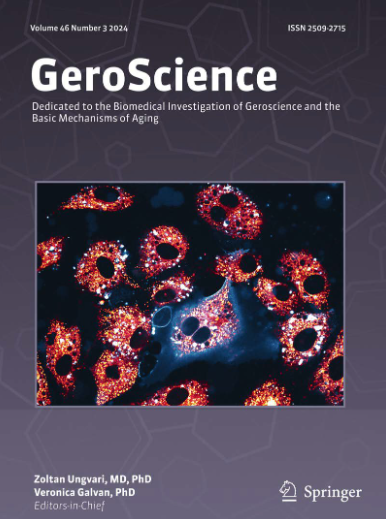The role of burnout prevention in promoting healthy aging: frameworks for the Semmelweis Study and Semmelweis-EUniWell Workplace Health Promotion Program.
IF 5.4
2区 医学
Q1 GERIATRICS & GERONTOLOGY
引用次数: 0
Abstract
As the European Union undergoes a demographic shift toward an aging population, the rising prevalence of age-related diseases poses significant public health challenges. Across the EU, disparities in health indicators and life expectancies highlight the urgency of addressing factors that contribute to unhealthy aging. Burnout, characterized by emotional, physical, and mental exhaustion, has emerged as a critical determinant of healthy aging, with profound biological, psychological, and social implications. Burnout accelerates age-related decline, exacerbates health risks, and undermines overall well-being. This review explores the role of burnout in unhealthy aging, highlighting its underlying mechanisms and proposing actionable interventions. Workplace-based initiatives-such as the Caring University Model Program at Semmelweis University, which includes the Semmelweis Study and the Semmelweis-EUniWell Workplace Health Promotion Program developed within the European University for Well-Being (EUniWell) framework-offer a novel, integrated approach to embedding burnout prevention within broader public health strategies. By drawing on global best practices-including the Blue Zones model and Mediterranean lifestyle principles-and adapting them to diverse cultural contexts across Europe, these programs aim to foster resilience, reduce stress, and enhance workforce well-being. Addressing burnout as a critical determinant of health, these initiatives offer a scalable blueprint for promoting healthy aging and improving productivity throughout the EU. By incorporating burnout prevention into regional and national health policies, European countries can collectively extend healthspan, reduce healthcare costs, and enhance the quality of life for their aging populations.职业倦怠预防在促进健康老龄化中的作用:Semmelweis研究和Semmelweis- euniwell工作场所健康促进计划框架。
随着欧盟人口结构向老龄化转变,与年龄有关的疾病日益流行,对公共卫生构成重大挑战。在整个欧盟,健康指标和预期寿命的差异突出了解决导致不健康老龄化的因素的紧迫性。以情绪、身体和精神疲惫为特征的职业倦怠已成为健康老龄化的关键决定因素,具有深远的生物、心理和社会影响。职业倦怠加速了与年龄相关的衰退,加剧了健康风险,并破坏了整体幸福感。本文探讨了职业倦怠在不健康老龄化中的作用,强调了其潜在机制,并提出了可行的干预措施。以工作场所为基础的倡议,如塞梅尔威斯大学的关怀大学模式项目,其中包括塞梅尔威斯研究和塞梅尔威斯-EUniWell工作场所健康促进项目,在欧洲幸福大学(EUniWell)框架内开发,提供了一种新颖的综合方法,将职业倦怠预防纳入更广泛的公共卫生战略。通过借鉴全球最佳实践,包括蓝区模式和地中海生活方式原则,并使其适应欧洲各地的不同文化背景,这些项目旨在培养适应力,减轻压力,提高员工福祉。这些举措将职业倦怠视为健康的关键决定因素,为整个欧盟促进健康老龄化和提高生产力提供了可扩展的蓝图。通过将倦怠预防纳入区域和国家卫生政策,欧洲国家可以共同延长健康寿命,降低医疗保健费用,并提高老龄人口的生活质量。
本文章由计算机程序翻译,如有差异,请以英文原文为准。
求助全文
约1分钟内获得全文
求助全文
来源期刊

GeroScience
Medicine-Complementary and Alternative Medicine
CiteScore
10.50
自引率
5.40%
发文量
182
期刊介绍:
GeroScience is a bi-monthly, international, peer-reviewed journal that publishes articles related to research in the biology of aging and research on biomedical applications that impact aging. The scope of articles to be considered include evolutionary biology, biophysics, genetics, genomics, proteomics, molecular biology, cell biology, biochemistry, endocrinology, immunology, physiology, pharmacology, neuroscience, and psychology.
 求助内容:
求助内容: 应助结果提醒方式:
应助结果提醒方式:


